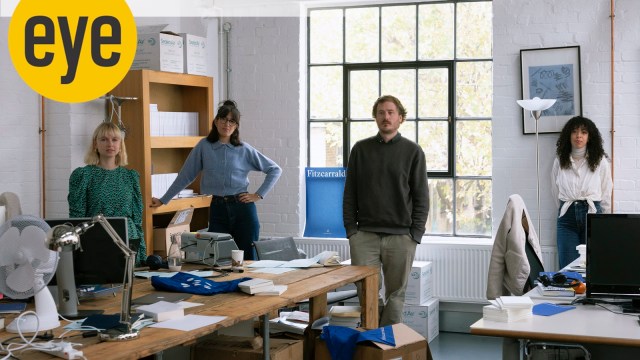Fitzcarraldo Editions has four of the last nine literature Nobel laureates on its list. Founder Jacques Testard on its unusual success story
This year’s recipient, Norwegian writer Jon Fosse, is Fitzcarraldo’s latest Nobel laureate, with Svetlana Alexievich (2015), Olga Tokarczuk (2018) and Annie Ernaux (2022) as past winners. Behind this improbable feat has been a great taste in literature, a sprinkling of luck and an unwavering commitment to their authors
 From left: Rosie Brown, Tamara Sampey-Jawad, Jacques Testard and Joely Day in FitzcarraldoÕs one-room office in London on Oct. 12, 2022. Fitzcarraldo Editions is not yet 10 years old and has only six full-time staff members. Since its founding, three of its authors have been awarded the Nobel Prize in Literature. (Kalpesh Lathigra/The New York Times)
From left: Rosie Brown, Tamara Sampey-Jawad, Jacques Testard and Joely Day in FitzcarraldoÕs one-room office in London on Oct. 12, 2022. Fitzcarraldo Editions is not yet 10 years old and has only six full-time staff members. Since its founding, three of its authors have been awarded the Nobel Prize in Literature. (Kalpesh Lathigra/The New York Times) The top prize in literature is notoriously elusive, with many publishing titans not even coming close to winning it in their whole lifetimes. Fitzcarraldo Editions, a tiny independent press launched in 2014, publishes four out of the last nine authors to have won the Nobel in Literature.
This year’s recipient, Norwegian writer Jon Fosse, is Fitzcarraldo’s latest Nobel laureate, with Svetlana Alexievich (2015), Olga Tokarczuk (2018) and Annie Ernaux (2022) as past winners. Behind this improbable feat has been a great taste in literature, a sprinkling of luck and an unwavering commitment to their authors.
“We publish authors rather than books,” says Jacques Testard, the 38-year-old publisher of Fitzcarraldo Editions. “When you start publishing someone, it’s unlikely you’re going to get a best seller with the first book. We are interested in offering stability… Even if your first three books don’t sell well, we’ll still do the fourth one,” he says.
As Testard sees things, it is all about developing a body of work. If he chooses to publish someone, he wants to publish them for a lifetime. In an industry dominated by corporate publishing houses constantly chasing best-sellers and dropping authors after a single commercial failure, Testard thinks of publishing as an intellectual project. “Fitzcarraldo exists to publish ambitious, innovative contemporary writing,” he says, “The prose should be of high quality… it’s the sentences really, that’s where it all starts.”
Judging the quality of prose, of course, is a subjective endeavour, steered by the publisher’s own taste. Growing up in a bilingual environment, Testard developed his by reading the best of French and English literature. An additional benefit of this has been that French publishers are also keener and quicker to publish translated work than English ones. This gives Testard early (often exclusive) access to writing that would be inaccessible to a majority of his peers.
For an indie publisher with limited means, this is a major advantage, allowing him to introduce ‘new’ writers to English readers. “In the case of Annie (Ernaux), in 2017, only two of her books had ever been published in the UK,” Testard says. Fitzcarraldo started publishing her work, two books a year, and rapidly built up a readership in the UK. Today, Ernaux is among Fitzcarraldo’s best-sellers. Of course, a Nobel helps in this regard. Before Ernaux won the prize last year, she had sold 41,000 copies with Fitzcarraldo in about five years. In a single year since then, she has sold 110,000 copies. And it is not just the Nobel laureates who reap the benefits of the award. “It gives additional visibility to the whole catalogue,” Testard says.
In the world of corporate publishing, where the publishing process has become homogenised, Testard is very conscious about developing a catalogue. Each Fitzcarraldo book bears the publisher’s imprint, most overtly in its cover design. Borrowing from French publishing traditions, the minimalist, series-style look developed by artist Ray O’Mara makes the books instantly identifiable. Blue covers are for fiction, white for non-fiction. “We want people to be loyal to the brand itself, even if they don’t know about the author,” Testard says, “They might pick up a Fitzcarraldo book because they would know that it’s something unusual, something distinctive, something of a high literary quality that they might not find with any other publishing house.”
Writer and translator Kate Briggs, whose non-fiction work, This Little Art (2017) and debut novel The Long Form (2023) were published by Testard, says her experience with Fitzcarraldo has been “transformative”.
“It’s not just about the success or otherwise of one book, it’s about co-building a body of work in the long-term. My sense is that this approach is unique within the UK landscape, especially for emerging writers… My books are written alone at my desk, but publishing with Fitzcarraldo I feel I am participating in a much broader conversation, one that’s happening between and across the books on the list: together we are exchanging ideas about form, the essay, the novel, about translation, aesthetics, politics and the environment (among other questions). It makes publishing feel less isolating, less individualised and self-interested, more co-dependent and collaborative,” she says.
In fact, when reading a submission, one of the questions Testard seeks to answer is this: “Is this something I can imagine being published by more mainstream press?” If the answer is yes, it is unlikely to be picked up by Fitzcarraldo. So far, this formula has worked, carving a unique niche for the press and making Testard a cult figure in the industry.
But Testard fell into publishing almost by chance. As a young man, he had wanted to be a journalist. He worked briefly for The Sunday Times and even had a summer-long stint at The Indian Express in 2008. But after a couple of internships in publishing houses in New York, he pivoted, never to leave the industry again.
In 2011, he launched a literary magazine, The White Review, with friend Ben Eastham. It gave Testard confidence in his literary tastes. He then published his first book, Deborah Levy’s Things I Don’t Want to Know: On Writing in 2013 for indie publisher Notting Hill Editions. After being let go by the company, he set off on his own venture.
With investment from a well-wisher, he had enough money to publish 10 books and pay rent in London for 18 months. As luck would have it, one of the 10 books he published was the English translation of Belarussian author Svetlana Alexievich’s Second Hand Time. Alexeivich won the Nobel a year later, bringing her international attention and doubling Testard’s initial investment. “I could sell the rights (to Second Hand Time) in America, India, South Africa, Australia and New Zealand. That enabled me to employ someone and start publishing more,” he says.
Fitzcarraldo published six books in its first year. Last year, it published 24. Growth has been rapid, yet organic, never departing from Testard’s founding philosophy. As he puts it, he is neither chasing commercial success, nor critical one. He is simply publishing quality literature he feels passionate about.
There is, of course, a risk to doing things this way. That is why Testard named his publishing house ‘Fitzcarraldo’ after the 1982 Werner Herzog classic. “The name is a not very subtle metaphor on the stupidity of setting up the publishing house… But it’s also supposed to signal a willingness to take risks, and to be ambitious in the kinds of books that we’re publishing,” he says.
- 01
- 02
- 03
- 04
- 05































